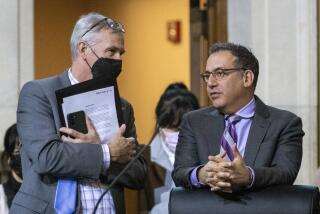City Layoffs Proposed to Prevent Service Cut : Budget deficit: Plan also calls for new business tax to maintain police and fire services targeted for trims. Heavy opposition expected from unions, businesses.
For the first time in recent memory, Los Angeles city officials on Tuesday recommended laying off employees as part of a plan to prevent reductions in police and fire service proposed last month by Mayor Tom Bradley.
Responding to a projected $71-million budget deficit, the City Council’s Budget and Finance Committee approved a plan that would cut 84 building inspectors and planners and also increase taxes on businesses that sell their products outside the state.
The proposals, to be taken up by the full City Council next week, are expected to encounter vehement opposition--the layoffs from city unions, and the tax increase from a business community that claims it is already overburdened by taxes and regulation.
But Councilman Zev Yaroslavsky, who made the proposals, said they are preferable to continuing to allow the Police and Fire departments to shrink under a more than 2-year-old hiring freeze.
“We are not going to allow any cuts in the Police Department,” Yaroslavsky said. “We are not going to allow any cuts in the Fire Department, especially when we are subsidizing other programs that are not needed.”
Yaroslavsky said planners and building inspectors have been underworked because of the slump in the building industry. The 84 employees proposed for layoff--61 in the Building and Safety Department and 23 in the Planning Department--must be paid for from the city’s general fund because fees from builders have dropped sharply, Yaroslavsky said.
The Yaroslavsky plan comes in response to Bradley’s proposal for closing a $71-million deficit caused by flagging tax receipts and a decrease in state funding to the city.
The mayor called for continuing the hiring freeze in all departments, meaning that attrition would claim another 129 officers and 48 civilian Police Department employees from a force of 7,800 officers by June, and the Fire Department would drop 56 firefighters and be forced to cut staffing in half at five stations.
The bad budget news comes less than six months after the city government struggled to cut $183 million from its programs by freezing spending, taking funds from the semi-independent Community Redevelopment Agency and deferring most equipment purchases.
Next week’s council debate will feature at least one more contentious issue--Bradley’s call for borrowing $20 million from a police and fire pension fund to balance the budget.
The mayor has said the money will be taken only once and repaid immediately, without any reduction in payment of pensions to retired police officers and firefighters.
But union representatives for both police officers and firefighters have pledged to fight the plan and file a lawsuit, if necessary, to stop it.
Danny Staggs, a director of the Police Protective League, said the action creates a worrisome precedent. “The fear is that they will come back (for more money) next year and the next year and the year after that,” Staggs said. “It’s wrong, both morally and legally, for them to do that,” added Andy Fox, president of the United Firefighters of Los Angeles.
The pension proposal received only Yaroslavsky’s support at Tuesday’s committee meeting. Councilman Richard Alatorre said he was opposed, and Councilman Joel Wachs said he was undecided.
Wachs said he also did not have enough information to support layoffs or the proposed business tax increase, but those matters were adopted with the support of Yaroslavsky and Alatorre.
Together, the new tax and the layoffs would raise $12.2 million. That would be enough money, with other minor adjustments, to bring the Police Department to its previously authorized staffing of 7,900.
The building inspectors and planners targeted for layoffs would be transferred to other positions not subject to the hiring freeze, if possible, Yaroslavsky said.
Despite that proviso, Yaroslavsky said he expected heavy opposition from employee unions. “This is going to be in for tough sailing,” he said. “I don’t know if we will have the eight votes for approval.”
The business tax would force Los Angeles businesses to pay based on their sales around the country, not just in the state of California. Yaroslavsky said the change would represent only a small increase for most firms--about $11 million in additional taxes citywide, compared to the $300 million already paid by businesses.
But skepticism greeted the proposal immediately after its presentation.
“An $11-million hit is an $11-million hit, and it creates a negative reaction by business,” said Ray Remy, president of the Los Angeles Area Chamber of Commerce. “We can’t support such a hit at this time.”
City Councilman Michael Woo has suggested it would be better to take the money from a fund used to build parking lots, saying that higher taxes will drive businesses out of Los Angeles.
“I don’t think it makes any sense to discourage manufacturing jobs when we are suffering through a recession,” said Woo, a mayoral candidate whose plan to hire more police was slammed by Yaroslavsky on Monday. “This is a loss that average people will feel, not just businesses.”
More to Read
Sign up for Essential California
The most important California stories and recommendations in your inbox every morning.
You may occasionally receive promotional content from the Los Angeles Times.











